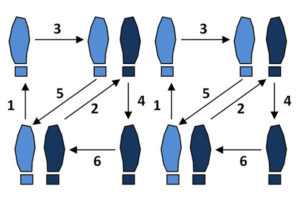 In New Zealand, because of our flexibility and laid back attitudes, it’s easy to conclude that a lack of formality and bureaucratic procedure is part of the reason why New Zealand company’s succeed.
In New Zealand, because of our flexibility and laid back attitudes, it’s easy to conclude that a lack of formality and bureaucratic procedure is part of the reason why New Zealand company’s succeed.
However, that conclusion is false.
Too many of New Zealand’s businesses are stuck in perpetual “start-up” mode, frozen at a small scale, still operating like small start ups with few standard systems and procedures even after decades of operation.
Consequently, new staff are always re-inventing the wheel, developing processes from scratch for routine operational processes.
Without documentation systems, new project teams have to develop their own processes for deployment and these processes can’t be easily handed on to the next set of new staff, leaving new staff to repeat the same grind.
Without systems, mistakes and gotchas can’t be flagged for subsequent staff to avoid.
Without timesheets how can the organisation control its costs? How can it apportion its overheads to particular projects and activities? How can the business know whether a particular activity makes money?
Too few business owners and managers are disciplined enough to put systems in place to be able to answer these questions with any rigor.
These questions seem so obvious yet why isn’t answering them prioritized? Often the lack of a systematic, disciplined approach results in poorly tested, and unreliable products and services.
Deployment under these circumstances results in much re-work and this gets in the way of product and service development, and places greater pressure on meeting contractual deadlines. In other words, fighting fires.
Not surprisingly, profitability is impaired but often managers comfort themselves with high gross margins. Such managers fool themselves into thinking they are still making money because all that re-work is still a hidden cost, buried among the overheads.
All that frenetic, frantic activity yet the company isn’t growing as it should.
Success is not just based on talent, expertise, knowledge, acumen or luck but also discipline. Systems provide discipline. Not just discipline for operational activity as we have just touched on, but also to strategy setting, business planning, goal and objective setting too.
In fact, if a lack of systems is creating bottlenecks that are constricting your company’s growth then implementing systems has become a strategic imperative.
Systems allow a winning formula to be replicated across a great many people and this is how businesses scale.
Implementing systems that encourage a systematic and disciplined approach to all your business activities (including sales and marketing) will allow your company to focus on the right things, control costs and scale to new heights.
Putting systems in place and gaining staff engagement to sustainably use them, takes leadership and hard work. In my experience, it’s an investment that is well worth the effort.



